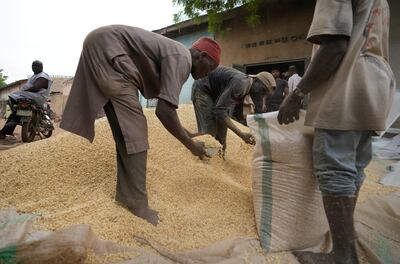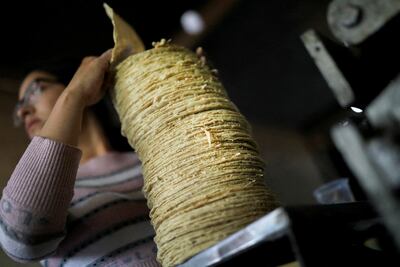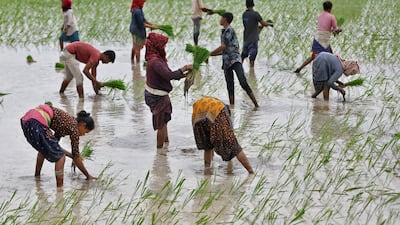India, the world's leading rice exporter, has imposed a ban on some overseas sales of the grain with immediate effect in the latest blow to the free flow of basic goods around the world.
The decision is primarily aimed at non-basmati white rice exports, which account for about a quarter of the country's total rice exports.
The ban was put in place to ensure ample domestic supply and to combat rising prices in the local market.
Rice is a staple food for more than three billion people worldwide and demand is rising sharply.
The availability of supply has become a huge issue amid constraints linked to the Covid-19 pandemic, geopolitical tension such as the conflict in Ukraine, as well as the onset of the weather phenomenon, El Nino.
All these factors have significantly affected production.
India's ban comes at a time when international rice prices have already hit their highest level in decades.
As the country contributes more than 40 per cent of all global rice shipments, the ban could exacerbate food insecurity in countries highly reliant on imports of the grain.
African nations, as well as Turkey, Syria and Pakistan are among those likely to be heavily affected as they are already battling high food-price inflation.
Despite the Indian government's previous efforts to control the situation by banning broken rice shipments and its move to impose a 20 per cent export tax on white rice in September, exports of non-basmati white rice jumped 35 per cent annually in the second quarter.
With the latest ban, prices are expected to rise further and alternative suppliers are unlikely to fill the gap left by India.
The decision coincides with strong gains in the global wheat market, triggering renewed concerns over rising food prices.
The cancellation of the Black Sea grain deal by Moscow, which previously protected Ukrainian exports, has already led to a jump in wheat prices.

Global food disruption
Various countries have also put in place, adjusted or lifted bans on different food items to control local prices and ensure domestic availability.
Ukraine's grain exports
In an attempt to control global food security and increase profits, Russia cancelled a deal enabling Ukrainian grain exports via the Black Sea, and carried out missile attacks on Ukraine's port cities, destroying significant grain stockpiles.
Five Eastern European countries, led by Poland, are pushing for an extension to the EU ban on Ukrainian grain imports until the end of the year as local farmers struggle with price drops due to cheap Ukrainian imports.
Poland has declared its intention to maintain the ban past its September 15 expiration, irrespective of the EU's decision.
European crop production
Drought has affected the yields of half of the land in the EU, raising fears about food production.
The southern part of the continent, particularly Spain and Portugal, has suffered from prolonged arid conditions that have significantly affected food and crop production.
Recent rainfall has done little to offset the effects of previous dry periods and extended heatwaves.
Simultaneously, a new drought is developing in the northern regions, including the UK, Ireland and Germany, due to severe lack of rain, stirring concerns about crop growth.
The European Commission plans to provide extra funding to EU farmers to help them cope with the adverse weather and high costs.
Kazakhstan's onion exports
Kazakhstan temporarily halted the export of onions in February 2023 to stabilise local prices.
The country's Interdepartmental Commission imposed a three-month ban in January 2023 after global demand rose due to natural disasters in Pakistan and a severe frost in Kazakhstan and Uzbekistan.
Onion stocks are sufficient for domestic consumption until the next harvest and the export ban is intended to ensure food security within the country.
This ban was suspended a month later and replaced by a limit on the volume of exports.
Belarus's measures
In a move to control domestic prices and amid statements that it has sufficient produce, Belarus banned the exports of apples, cabbages and onions, with the move affecting even its main buyer Russia.
However, the decision is not expected to significantly impact prices but may harm trade and reduce state revenue, as Belarus's import quantities for these goods annually exceed their exports.
Experts predict this ban may cause a short-term drop in prices, potentially followed by a rise if production is reduced in response.
Mexico bans white corn exports
The Mexican government imposed a temporary 50 per cent tax on white corn exports to ensure domestic supply and price stability.
This decision was based on the crucial role of white corn in Mexican cuisine, being a primary ingredient in tortillas.
This comes amid an continuing dispute between Mexico and the US over the former's decision to ban genetically modified corn and phase out the herbicide, glyphosate, by 2024.

Malaysia's chicken exports
The Malaysian government lifted a ban on chicken exports, except for day-old chicks, from July 1, 2023, to boost revenue and cash flow into the country, said Agriculture and Food Security Minister Mohamad Sabu
The ban was imposed last year to secure domestic supplies and control the increase in food prices, prompted by a global feed shortage amplified by the Russia-Ukraine conflict.
The country, which primarily exports live chickens to Singapore and Thailand, faced a slight glut, causing chicken prices to drop below the government's set ceiling.
The government will extend subsidies on egg and chicken production beyond July 1, and retain price controls on these food staples.
The move aims to ensure the welfare of the public and sustainability of the poultry industry as feed costs rise due to the Covid-19 pandemic and the Ukraine war.


